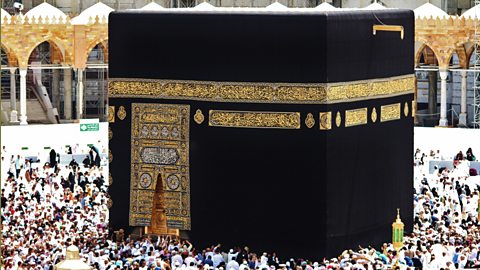Hajj
Hajj is the Muslim pilgrimageA journey which has religious or spiritual significance, usually to an important religious place., which it is compulsory for Muslims to undertake at least once in their lifetime as long as they are healthy and can afford it. In order for it to count, a Muslimās journey must take place within the month of ¶Ł³ó³Üāl-±į¾±ĀįĀį²¹, the 12th and final month of the Islamic calendar.
Origins of Hajj
God told the prophet Ibrahim to take his wife Hajira and son Ismaāil on a journey to Arabia. He then told Ibrahim to leave Hajira and Ismaāil with some food and water.
Having run out of water, Hajira ran up and down two hills, Safa and Marwah, in search of more. Unable to find any water, she prayed to God and water then sprang from the ground. This source of water is called the ZamzamA well near the Ka'bah which is believed provided water for Hajira and Isma'il when they were dying of thirst. well.
When Ibrahim returned, he was commanded to build the Ka'aba or KaābahThe cube-shaped building in the centre of Makkah (Mecca), which is the most sacred site in Islam. as a shrine dedicated to Allah where worship would take place.

Over time, people began to worship idols at the °²¹āa²ś²¹ instead of the one God, Allah. However, MuhammadThe name of the final Prophet of Islam. restored the °²¹āa²ś²¹ to its original purpose when he converted Makkah to Islam.
Key events of Hajj
- On the journey, Muslims change their clothes for two white cloths and enter the state of ihramSimple clothing worn by pilgrims, consisting of two lengths of white cloth for men, and for women normal clothing with face and hands uncovered.. This shows equality as everyone, regardless of their ethnicity, nationality or socio-economic status, is dressed in a similar way.
- The pilgrims arrive at the Great Mosque, a spiritual place for Muslims as it is viewed by many as Allahās house. Here they circle the °²¹āa²ś²¹ seven times, which is called TawafWalking seven times around the Kaābah in worship of Allah. A part of Hajj and Umrah..
- A drink is taken from the ZamzamA well near the Ka'bah which is believed provided water for Hajira and Isma'il when they were dying of thirst. well in remembrance of Hajiraās search for water. This shows Muslimsā dependence on Allah.
- The pilgrims visit the hills of Safa and Marwah, and run between the two seven times to replicate the actions of Hajira. She was determined, as all Muslims must be, and they must never give up.
- Muslims stop at Mount ArafatA plain a few kilometres from Makkah (Mecca) with a hill at its centre known as the Mount of Mercy, the place where the Prophet Muhammad delivered his Farewell Sermon. Here pilgrims gather to worship and ask for forgiveness on the second day of the Hajj, the ninth day of the Islamic month of Dhul-Hijjah, the day before Eid-ul-Adha., the place where Muhammad gave his final sermon, and they pray while hoping to be forgiven for their sins. This is where the Day of JudgementThe last day, when God judges all of humanity according to how they have lived. will take place.
- Muslims spend the night at Muzdalifa, a valley between Arafat and MinaA place near Makkah (Mecca), where pilgrims perform some of the observances of the Hajj.. At Muzdalifa they collect pebbles, which are required for the following day.
- They then travel to Mina, where they stone the Devil. They throw pebbles at three stone pillars constructed to represent the Devil. Ibrahim is said to have done this. It is important that Muslims show that they reject the Devil.
- Id-ul-Adha is the Feast of Sacrifice, which is celebrated by all Muslims, not just those completing Hajj.
Importance of Hajj
Those completing the Hajj are known as Hajji. Everyone taking part in the Hajj pilgrimage is treated as an equal and there is a great sense of unity. The pilgrimage shows self-discipline and fulfils a religious duty, bringing Muslims closer to God.
Some HadithThe sayings of the Prophet Muhammad, as remembered and recounted by those close to him. agree that sins are cleansed by the journey: He will return as if he were born anew (Sahih al-Bukhari 26:596).
Question
What is the importance of Hajj?
It fulfils a religious duty.